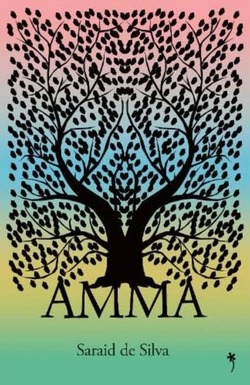Amma (2024) by Saraid de Silva is a time-hopping, peripatetic debut novel that explores the matrilineal line of a single family over three generations. Though it chronologically runs from 1951 through 2019, de Silva presents a fractured narrative, jumping back and forward between key situations in the characters’ lives, gradually peeling away the layers of its story to reveal a tale about diaspora, family, and fitting in.
The novel opens in London, 2018, with Annie Ano Fernando, calling upon her uncle Suri who she has never met. No sooner has he opened the door, we are whisked off Invercargill in 1984, to meet a school-aged instance of Sithara, Annie’s mother. Then, following an incident there with local lads, we land in Singapore, in 1951, where the story finds its real inciting incident. Ten year old Josephina (the Amma of the title) is locked in a room with a rich Englishman, her potential new father-in-law, who rapes her, seemingly with her parents’ tacit approval. It’s an awful and scarring moment that effectively drives the generational dynamic and the attitudes therein.
Across the decades, we may say that all human life is here, but even while weighted to the more miserable side, it never feels heavy or forced. In fact, there’s a lightness to de Salva’s prose and it’s polished enough to sparkle (“They sieve her, trying to shake out a flaw.”) while never being showy. But where the real strength comes is in the believable characters that run through its pages. Come the last page, I could happily have spent more time with them. Maybe this is because we see them all growing up, as the book hops around, and we see how their reaction to events in the past have shaped their future. But maybe just because, through good and bad, they are fully-formed and full of life.
In reading Amma, I was somewhat reminded of Jonathan Escoffery’s recent debut, If I Survive You (2022) where the younger son in an immigrant family searched for himself at the crossroads of culture and community. Amma treads similar, if less experimental ground, with its three generations experiencing difficulties fitting in, not just in terms of place but with each other.
With Annie, naive to her family’s past, she acts as a way into the broader story. Her youthful zest is at odds with those that have gone before, Her attitude to her abusive father is one-eighty to her mother’s open arms. The experience around her sexuality comes differently than to her gay uncle. But familial attitudes are ultimately driven by her gran whose own shame resonates through the bloodline directing attitudes and actions.
Overall it’s a tight storyline, with great steady-as-she-goes writing (though I occasionally got a bit disoriented with the switching timelines). Across its canvas we find people are likely to find their place in the world easier, whether that be in geography, relationships, or sexuality when acceptance is at the heart of families that move forward with neither secrets nor shame.
